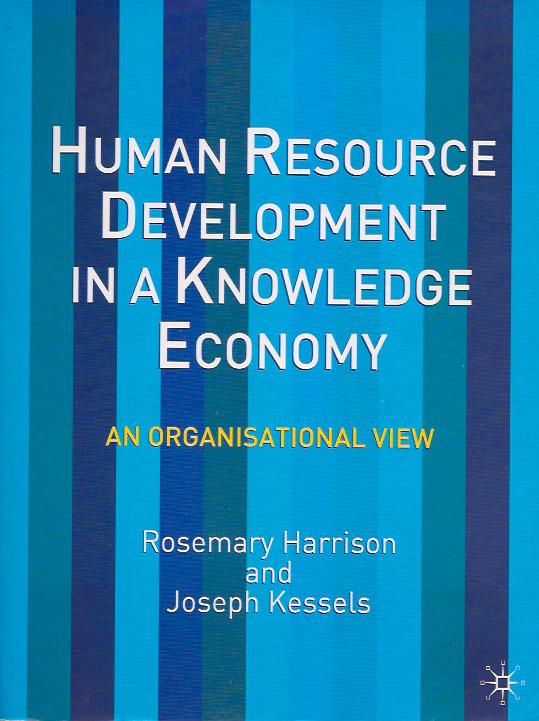Harrison, R. & Kessels, J.W.M. (2004). Human Resource Development in a Knowledge Economy. An organisational view

Harrison, R. & Kessels J.W.M. (2004). Human Resource Development in a knowledge economy. An organizational view. Hampshire – New York: Palgrave Macmillan. (301 p.) (ISBN: 0-333-99015-3)
Scope of the book
In this book we aim to link the domain of organisationally based human resource development (HRD) powerfully to that of learning and knowledge in an emergent knowledge economy. Our aim is a critical text that reviews HRD’s development and current status as an organisational process, and that identifies new HRD roles and tasks in an emergent knowledge economy. By that we mean an economy in which the application of knowledge to continuous improvement and radical innovation to goods, services and processes is the most important source of advantage for organisations. In such organisations the ideal is that:
People at all levels have accumulated knowledge about what customers want, about how best to design products and processes, about what has worked in the past and what hasn’t. A company that can collect all that knowledge and share it between employees will have a huge advantage over an organisation that never discovers what its people know.
(Skapinker, 2002:1)
We explain in our opening chapter that the emergence of a knowledge economy requires a fundamental shift in ways of understanding organisations and of facilitating learning and development of those working for, or in partnership with, them. This shift creates an urgent need to evaluate the contribution that HRD processes can make to organisations operating in such an economy. That is our task in this book. It has led us to survey a wide and broad-based literature of HRD and learning within a wider context of business-strategy and human resource management, and against analysis of HRD practice at international, national and organisational levels.
Our task has given the book a special character. It means that our concern throughout is with critical strategic issues concerning the function that HRD can fulfil in organisations operating in a new type of economy, and with the changing roles and challenges for HRD practitioners that are involved here. Our primary emphasis is on processes of strategy, organising, knowledge development and new information and communication technology. We have paid proportionately less attention to operational tasks and techniques to do with the design, development, facilitation and review of learning activities, the production of instructional material and to the assessment of learning outcomes.
It seems to us that in a book devoted to an exploration of the emergent knowledge economy and its implications for human and social capital in an organisation it is vital to engage readers actively in a reflection on, and critical examination of, major issues likely to affect them in their current organisational roles, in those to which they aspire, and in those that they may have to assume in future. The concept of knowledge as a process that is continuously formed, developed and changed by human interactions goes to the heart of the book, and is therefore mirrored in its design.
We hope that the scope of the book and the learning aids that it incorporates will help readers to experience the unique mix of excitement, frustration and continuing drive to 'know' that we ourselves have felt as we have grappled with many barriers in our customary ways of thinking in order to enter and explore the ambiguous, formidable but extraordinarily enticing 'new world' of HRD in an emergent knowledge economy.
Rosemary Harrison and Joseph Kessels
The book is available at Palgrave Macmillan
